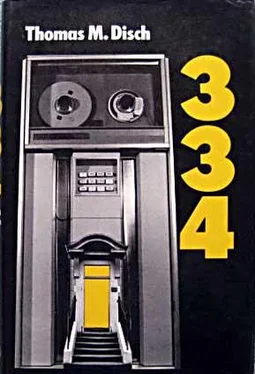“Take a factory,” Ab said. “It’s the same sort of thing exactly,” What kind of factory Chapel wanted to know.
Ab tipped his chair back, settling into the theory as if it were a warm whirlpool bath in Hydrotherapy. He’d eaten two lunches that Chapel had brought down and felt friendly, reasonable, in control. “Any kind. You ever worked in a factory?”
Of course he hadn’t. Chapel? Chapel was lucky to be pushing a cart. So Ab went right on. “For instance—take an electronics-type factory. I worked in one once, an assembler.”
“And you made something, right?”
“Wrong! I put things together. There’s a difference if you’d use your ears for one minute instead of that big mouth of yours. See, first off this box comes down the line, and I’d stick in this red board sort of thing, then tighten some other mother on top of that. Same thing all day, simple as A-B-C. Even you could have done it, Chapel.” He laughed.
Chapel laughed.
“Now what was I really doing? I moved things, from here to there….” he pantomimed here and there. The little finger of the left hand ended at the first knuckle. He’d done it himself at his initiation into thek ofc twenty years ago (twenty-five actually), a single chop of the old chopper, but when people asked he said it was an industrial accident and that was how that goddamned system destroyed you. But mostly people knew better than to ask.
“But I didn’t make anything at all, you see? And it’s the same in any other factory—you move things or you put them together, same difference.”
Chapel could feel he was losing. Ab talked faster and louder, and his own words came out stumbling. He hadn’t wanted to argue in the first place, but Ab had tangled him in it without his knowing how. “But something, I don’t know, what you say is … But what I mean is—you’ve got to have common sense, too.”
“No, this is science.”
Which brought such a look of abject defeat to the old man’s eyes it was as if Ab had dropped a bomb, boff, right in the middle of his black, unhappy head. For who can argue against science. Not Chapel, sure as hell.
And yet he struggled up out of the rubble still championing common sense. “But things get made—how do you explain that?”
“Things get made, things get made,” Ab mimicked in a falsetto voice, though of the two men’s voices Chapel’s was deeper. “What things?”
Chapel looked round the morgue for an example. It was all so familiar as to be invisible—the slab, the carts, the stacks of sheets, the cabinet with its stock of fillers and fluids, the desk…. He lifted a black Identi-Band from the clutter on the desk. “Like plastic.”
“Plastic?” Ab said in a tone of disgust. “That just shows how much you know, Chapel. Plastic.” Ab shook his head.
“Plastic,” Chapel insisted. “Why not?”
“Plastic is just putting chemicals together, you illiterate.”
“Yeah, but.” He closed one eye, squeezing the thought into focus. “But to make the plastic they’ve got to—heat it. Or something.”
“Right! And what’s heat?” he asked, folding his hands across his gut, victorious, full. “Heat is kinetic energy.”
“Shit,” Chapel maintained. He massaged his stubbly brown scalp. Another argument lost. He never understood how it happened.
“Molecules,” Ab summed up, “moving. Everything breaks down to that. It’s all physics, a law.” He let loose a large fart and pointed his finger, just in time, at Chapel’s groin.
Chapel made a smile acknowledging Ab’s triumph. It was science all right. Science battered everyone into submission if it was given its way. It was like trying to argue with the atmosphere of Jupiter, or electric sockets, or the steroid tablets he had to take now—things that happened every day and never made sense, never would, never.
Dumb nigger, Ab thought, feeling friendlier in proportion to Chapel’s perplexity. He wished he could have kept him arguing a while longer. There was still religion, psychosis, teaching, lots of possibilities. Ab had arguments to prove that even these jobs, which looked so mental and abstract on the surface, were actually all forms of kinetic energy.
Kinetic energy: once you understood the meaning of kinetic energy all kinds of other things started becoming clear.
“You should read the book,” Ab insisted.
“Mm,” Chapel said.
“He explains it in more detail.” Ab hadn’t read the entire book himself, only parts of the condensation, but he’d gotten the gist of it.
But Chapel had no time for books. Chapel, Chapel pointed out, was not one of your intellectuals.
Was Ab? Intellectual? He had to think about that one for a while. It was like wearing some fruity color transparency and seeing himself in a changing booth mirror, knowing he would never buy it, not daring even to walk out on the sales floor, but enjoying the way it fitted him anyhow: an intellectual. Yes, possibly in some other reincarnation Ab had been an intellectual, but it was a goofy idea all the same.
Right on the button, at 1:02, they rang down from ‘A’ Surgery. A body.
He took down the name in the logbook. He’d neglected to start a new page and the messenger hadn’t come by yet for yesterday’s, so he entered Time of Death as 11:58 and printed the name in neat block letters: NEWMAN, BOBBI.
“When can you get her?” asked the nurse, for whom a body still possessed sex.
“I’m there already,” Ab promised.
He wondered what age it would be. “Bobbi” was an older type name but there were always exceptions.
He booted Chapel out, locked up, and set off with the cart to ‘A’ Surgery. At the bend of the corridor, right before the ramp, he told the new kid at the desk to take his calls. The kid wiggled his skimpy ass and made some dumb joke. Ab laughed. He was feeling in top shape, and it was going to be a good night. He could tell.
Chapel was the only one on and Mrs. Steinberg, who was in charge tonight, though not actually his boss, said, “Chapel, ‘B’ Recovery,” and handed him the slip.
“And move,” she added off-handedly, as another woman might have said, “God bless you,” or “Take care.”
Chapel, however, had one speed. Difficulties didn’t slow him down; anxieties made him go no faster. If somewhere there were cameras perpetually trained on him, viewers who studied his slightest actions, then Chapel would give them nothing to interpret. Loaded or empty, he wheeled his cart along the corridors at the same pace he took walking home after work to his hotel on 65th. Regular? As a clock.
Outside ‘M’ Ward, on 4, by the elevators, a blond young man was pressing a urinal against himself, trying to make himself piss by groaning at his steel pot. His robe hung open, and Chapel noticed that his pubic hair had been shaved off. That usually meant hemorrhoids.
“How’s it going?” Chapel asked. His interest in the patients’ stories was quite sincere, especially those in Surgery or ENT wards.
The blond young man made an anguished face and asked Chapel if he had any money.
“Sorry.”
“Or a cigarette?”
“I don’t smoke. And it’s against the rules, you know.”
The young man rocked from one leg to the other, coddling his pain and humiliation, trying to blot out every other sensation in order to go the whole way. Only the older patients tried, for a while at least, to hide their pain. The young ones gloried in it from the moment they gave their first samples to the aide in Admissions.
While the substitute in ‘B’ Recovery completed the transfer forms Chapel went over to the other occupied unit. It held, still unconscious, the boy he’d taken up earlier from Emergency. His face had been a regular beef stew; now it was a tidy volleyball of bandages. From the boy’s clothes and the tanned and muscly trimness of his bare arms (on one biceps two blurry blue hands testified to an eternal friendship with “Larry”) Chapel inferred that he would have had a good-looking face as well. But now? No. If he’d been registered with one of the private health plans, perhaps. But at Bellevue there was neither staff nor equipment for full-scale cosmetic work. He’d have eyes, nose, mouth, etc., all the right size and sitting about where they ought to, but the whole lot together would be a plastic approximation.
Читать дальше












